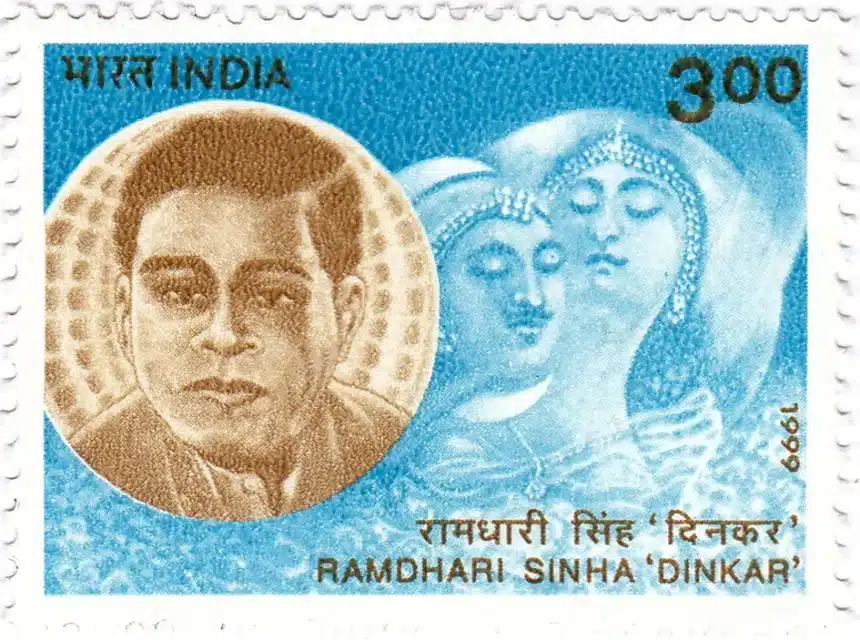Ramdhari Singh ‘Dinkar’ (23 September 1908 – 24 April 1974) was an Indian Hindi poet, essay writer, and academician. ‘Rashtrakavi Dinkar’ is established as the poet of the best heroic rasa of the modern era. He gained immense popularity due to his powerful poems that inspired the revolutionary struggle, filled with national sentiments.
Shree Dinkar was born in Simaria, Bengal Presidency, British India. He grew up in abject poverty. While studying at Mokama High School, he could not afford to stay in boarding school because of the fee and associated costs. He has to leave the school after the lunch break to catch the boat for getting back home. His poverty has a vivid reflection in his own poetry. He studied history, politics, and philosophy. Whereas language is concerned, he studied Sanskrit, Maithili, Bengali, Urdu, and English.
Dinkar was greatly influenced by Iqbal, Rabindranath Tagore, Keats, and Milton and translated works of Rabindranath Tagore from Bengali to Hindi. His artistic character was shaped during the Indian freedom movement. Dinkar initially supported the revolutionary movement during the Indian independence struggle, but later became a Gandhian. However, he used to call himself a ‘Bad Gandhian’ because he supported the feelings of indignation and revenge among the youth. In Kurukshetra, he accepted that war is destructive but argued that it is necessary for the protection of freedom. He was close to prominent nationalists of the time such as Rajendra Prasad, Anugrah Narayan Sinha, Sri Krishna Sinha, Rambriksh Benipuri, and Braj Kishore Prasad.
https://observervoice.com/remembering-sumitranandan-pant-2388/
His writings:
He was majorly a poet and all other things after that. He has written most of the poems in Veer Rasa and Shringar Rasa. Veer Rasa stands for the poetry of valour and Shringar Rasa stands for the poetry of love, romance and beauty. He was writing romantic poems at early stages but later he realised the need of the nation and started to write nationalist poems as well. The poem ‘Himalaya’ is one of them; this poem ignited the fires in youths.
His poems were relevant and still, it’s very much contemporary that anyone can find these works of Hindi literature fit into the blocks of the modern world. The contemporary authors still feel attached to him as poets of those times felt with Dinkar. His writings were inspirational and motivational. He has touched many genres of poems from romanticism to valour and made an immense contribution in the respective field. His poems have a rhythmic flow that you cannot resist yourself to read it aloud with flow.
He depicted the condition of poverty through his writings. He never forgot from where he had come that’s why he always reflected those situations in his poems. These lines are enough to understand the depth of his poetry and his command over the original situation of that time.
“रेशमी कलम से भाग्य लिखने वालो
तुम भी अभाव से कभी ग्रस्त हो रोये हो ?
बीमार किसी बच्चे की दवा जुटाने में
तुम भी क्या घर पर पेट बाँधकर सोये हो ?”
He was a genuine poet who reflected the situation of India from one hand and from another hand, he glorified our strong culture through poems like “Urvashi”, “Kurukshetra” and many others. He hailed his religion and glorified the enriched and strong culture and tradition of a great nation like India on the world stage.
During The Emergency, Jayaprakash Narayan had attracted a gathering of one lakh people at the Ramlila grounds and recited Dinkar’s famous poem: Singhasan Khaali Karo Ke Janata Aaati Hai (Devanagari: सिंहासन खाली करो कि जनता आती है; “Vacate the throne, for the people come”).
Shree Dinkar was elected three times to the Rajya Sabha, and he was a member of this house from 3 April 1952 – 26 January 26, 1964. He was awarded the Padma Bhushan in 1959. In the same year, Sahitya Akademi Award was bestowed upon him. In 1972, he was awarded with Bharatiya Jnanpith award. He was also the Vice-Chancellor of Bhagalpur University (Bhagalpur, Bihar) in the early 1960s.
In 1999, Dinkar was one of the Hindi writers featured on a set of commemorative postal stamps released by the Government of India to celebrate the linguistic harmony of India, marking the 50th anniversary since India adopted Hindi as its official language.

